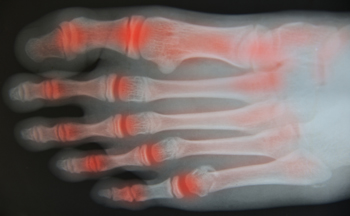October 2018
Noticeable Symptoms of an Ingrown Toenail
 If you are experiencing pain and discomfort surrounding the nail of your big toe, you may have what is known as an ingrown toenail. This uncomfortable condition is typically the result of a toenail that grows into the skin or over the edges of the nail. Bacteria may enter the area, and this may possibly lead to the development of an infection. There may be noticeable symptoms of this occurring, including an unpleasant odor or drainage coming from the toenail. There may be several causes for ingrown toenails to develop. These may include wearing shoes and socks that are too small, injuries the nail may have incurred, or trimming the toenails incorrectly. If you have an ingrown toenail, it’s suggested to speak with a podiatrist before it becomes infected, so the proper course of treatment can begin.
If you are experiencing pain and discomfort surrounding the nail of your big toe, you may have what is known as an ingrown toenail. This uncomfortable condition is typically the result of a toenail that grows into the skin or over the edges of the nail. Bacteria may enter the area, and this may possibly lead to the development of an infection. There may be noticeable symptoms of this occurring, including an unpleasant odor or drainage coming from the toenail. There may be several causes for ingrown toenails to develop. These may include wearing shoes and socks that are too small, injuries the nail may have incurred, or trimming the toenails incorrectly. If you have an ingrown toenail, it’s suggested to speak with a podiatrist before it becomes infected, so the proper course of treatment can begin.
Ingrown toenails can become painful if they are not treated properly. For more information about ingrown toenails, contact one of our podiatrists of Advanced Foot & Ankle Associates, PLLC. Our doctors can provide the care you need to keep you pain-free and on your feet.
Ingrown Toenails
Ingrown toenails occur when a toenail grows sideways into the bed of the nail, causing pain, swelling, and possibly infection.
Causes
- Bacterial infections
- Improper nail cutting such as cutting it too short or not straight across
- Trauma to the toe, such as stubbing, which causes the nail to grow back irregularly
- Ill-fitting shoes that bunch the toes too close together
- Genetic predisposition
Prevention
Because ingrown toenails are not something found outside of shoe-wearing cultures, going barefoot as often as possible will decrease the likeliness of developing ingrown toenails. Wearing proper fitting shoes and using proper cutting techniques will also help decrease your risk of developing ingrown toenails.
Treatment
Ingrown toenails are a very treatable foot condition. In minor cases, soaking the affected area in salt or antibacterial soaps will not only help with the ingrown nail itself, but also help prevent any infections from occurring. In more severe cases, surgery is an option. In either case, speaking to your podiatrist about this condition will help you get a better understanding of specific treatment options that are right for you.
If you have any questions please feel free to contact one of our offices located in Lake Worth and Aledo/Willow Park, TX . We offer the newest diagnostic and treatment technologies for all your foot and ankle needs.
Swollen Feet May Be Common During Pregnancy
 Research has shown that many women suffer from specific physical ailments during their pregnancies, and swollen feet is one of the more common uncomfortable conditions. Women who are pregnant undergo a multitude of changes, which may often result in swollen feet and ankles. These may include the blood becoming thicker, which may be a consequence of unpreventable changes in the blood chemistry. Many women have learned to manage swollen feet during their pregnancies, and this may be accomplished by elevating the feet frequently during the day, drinking plenty of fresh water as often as possible, and maintaining a gentle exercise program. Additionally, it may be advised to sleep on your left side, which may help to regulate blood flow in the body. If you would like additional information about the effects pregnancy may have on your feet, please counsel with a podiatrist.
Research has shown that many women suffer from specific physical ailments during their pregnancies, and swollen feet is one of the more common uncomfortable conditions. Women who are pregnant undergo a multitude of changes, which may often result in swollen feet and ankles. These may include the blood becoming thicker, which may be a consequence of unpreventable changes in the blood chemistry. Many women have learned to manage swollen feet during their pregnancies, and this may be accomplished by elevating the feet frequently during the day, drinking plenty of fresh water as often as possible, and maintaining a gentle exercise program. Additionally, it may be advised to sleep on your left side, which may help to regulate blood flow in the body. If you would like additional information about the effects pregnancy may have on your feet, please counsel with a podiatrist.
Pregnant women with swollen feet can be treated with a variety of different methods that are readily available. For more information about other cures for swollen feet during pregnancy, consult with one of our podiatrists from Advanced Foot & Ankle Associates, PLLC. Our doctors will attend to all of your foot and ankle needs.
What Foot Problems Can Arise During Pregnancy?
One problem that can occur is overpronation, which occurs when the arch of the foot flattens and tends to roll inward. This can cause pain and discomfort in your heels while you’re walking or even just standing up, trying to support your baby.
Another problem is edema, or swelling in the extremities. This often affects the feet during pregnancy but tends to occur in the later stages.
How Can I Keep My Feet Healthy During Pregnancy?
- Wearing orthotics can provide extra support for the feet and help distribute weight evenly
- Minimize the amount of time spent walking barefoot
- Wear shoes with good arch support
- Wear shoes that allow for good circulation to the feet
- Elevate feet if you experience swelling
- Massage your feet
- Get regular, light exercise, such as walking, to promote blood circulation to the feet
If you have any questions please feel free to contact one of our offices located in Lake Worth and Aledo/Willow Park, TX . We offer the newest diagnostic and treatment technologies for all your foot and ankle needs.
Is Rheumatoid Arthritis Common?
 One of the most common types of arthritis is referred to as rheumatoid arthritis. Many people may experience symptoms of this condition in the feet and are aware of the pain and discomfort that typically exists with this ailment. There are specific symptoms that may accompany this type of arthritis, including swelling and soreness in the feet, difficulty waking, which may be a result of unstable joints, or the foot possibly changing shape. Research has shown the part of the foot that may be affected the most are the toes, which consist of smaller joints. They may begin to look deformed and may have difficulty in moving or bending. There may be additional foot conditions that may arise including the development of corns and calluses. This may be a result of changes in the foot shape. If you are afflicted with rheumatoid arthritis, it is suggested to consult with a podiatrist who can offer proper treatment techniques.
One of the most common types of arthritis is referred to as rheumatoid arthritis. Many people may experience symptoms of this condition in the feet and are aware of the pain and discomfort that typically exists with this ailment. There are specific symptoms that may accompany this type of arthritis, including swelling and soreness in the feet, difficulty waking, which may be a result of unstable joints, or the foot possibly changing shape. Research has shown the part of the foot that may be affected the most are the toes, which consist of smaller joints. They may begin to look deformed and may have difficulty in moving or bending. There may be additional foot conditions that may arise including the development of corns and calluses. This may be a result of changes in the foot shape. If you are afflicted with rheumatoid arthritis, it is suggested to consult with a podiatrist who can offer proper treatment techniques.
Because RA affects more than just your joints, including the joints in your feet and ankles, it is important to seek early diagnosis from your podiatrist if you feel like the pain in your feet might be caused by RA. For more information, contact one of our podiatrists of Advanced Foot & Ankle Associates, PLLC. Our doctors will assist you with all of your podiatric concerns.
What Is Rheumatoid Arthritis?
Rheumatoid Arthritis (RA) is an autoimmune disorder in which the body’s own immune system attacks the membranes surrounding the joints. Inflammation of the lining and eventually the destruction of the joint’s cartilage and bone occur, causing severe pain and immobility.
Rheumatoid Arthritis of the Feet
Although RA usually attacks multiple bones and joints throughout the entire body, almost 90 percent of cases result in pain in the foot or ankle area.
Symptoms
- Swelling and pain in the feet
- Stiffness in the feet
- Pain on the ball or sole of feet
- Joint shift and deformation
Diagnosis
Quick diagnosis of RA in the feet is important so that the podiatrist can treat the area effectively. Your doctor will ask you about your medical history, occupation, and lifestyle to determine the origin of the condition. Rheumatoid Factor tests help to determine if someone is affected by the disease.
If you have any questions please feel free to contact one of our offices located in Lake Worth and Aledo/Willow Park, TX . We offer the newest diagnostic and treatment technologies for all your foot and ankle needs.
Blog Archives
- May 2025
- April 2025
- March 2025
- February 2025
- January 2025
- December 2024
- November 2024
- October 2024
- September 2024
- August 2024
- July 2024
- June 2024
- May 2024
- April 2024
- March 2024
- February 2024
- January 2024
- December 2023
- November 2023
- October 2023
- September 2023
- August 2023
- July 2023
- June 2023
- May 2023
- April 2023
- March 2023
- February 2023
- January 2023
- December 2022
- November 2022
- October 2022
- September 2022
- August 2022
- July 2022
- June 2022
- May 2022
- April 2022
- March 2022
- February 2022
- January 2022
- December 2021
- November 2021
- October 2021
- September 2021
- August 2021
- July 2021
- June 2021
- May 2021
- April 2021
- March 2021
- February 2021
- January 2021
- December 2020
- November 2020
- October 2020
- September 2020
- August 2020
- July 2020
- June 2020
- May 2020
- April 2020
- March 2020
- February 2020
- January 2020
- December 2019
- November 2019
- October 2019
- September 2019
- August 2019
- July 2019
- June 2019
- May 2019
- April 2019
- March 2019
- February 2019
- January 2019
- December 2018
- November 2018
- October 2018




